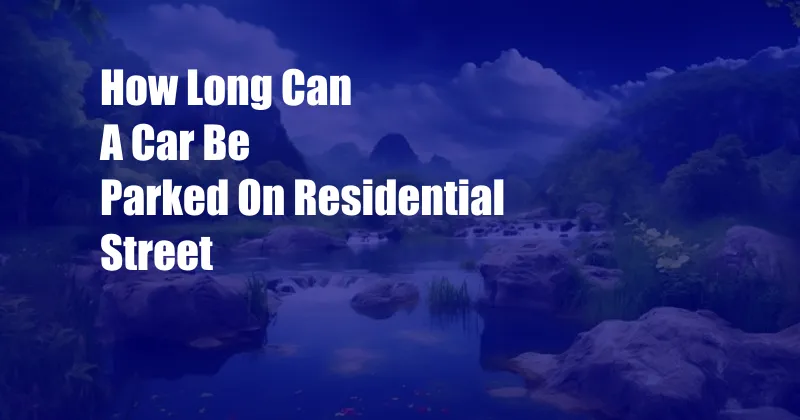
How Long Can You Park a Car on a Residential Street?
As a new driver, it took me a while to get used to the ins and outs of parking. One of the most confusing things was figuring out how long I could park on a residential street. I always worried about getting a ticket if I left my car in one spot for too long. So how long can you park a car on a residential street? The answer varies depending on your location, but I’ll give you a general overview of the rules and regulations.
According to the National Highway Traffic Safety Administration (NHTSA), there is no federal law that governs how long a car can be parked on a residential street. However, most cities and towns have their own ordinances that regulate parking on residential streets. These ordinances vary from place to place, so it’s important to check with your local authorities to find out the specific rules for your area.
Parking Restrictions
Most residential street parking restrictions fall into one of two categories:
- Time-limited parking: This type of restriction limits the amount of time that a vehicle can be parked in a particular spot. Time limits can range from 30 minutes to several hours, and they are usually enforced by signs posted on the street.
- Overnight parking: This type of restriction prohibits parking on residential streets during certain hours of the night, typically between 2:00 AM and 6:00 AM. Overnight parking restrictions are usually put in place to allow for street cleaning and other maintenance activities.
In addition to time-limited and overnight parking restrictions, there may also be other restrictions that apply to parking on residential streets. For example, some cities and towns prohibit parking on certain sides of the street on certain days of the week. Others may prohibit parking in front of fire hydrants, driveways, or intersections. Be sure to read the signs posted on the street carefully to make sure that you are not violating any parking restrictions.
Consequences of Violating Parking Restrictions
If you violate a parking restriction, you may be subject to a fine or other penalty. The amount of the fine will vary depending on the severity of the violation and the location where it occurred. In some cases, you may also be required to have your vehicle towed at your own expense.
To avoid getting a parking ticket, it is important to be aware of the parking restrictions in your area and to follow them carefully. If you are unsure about whether or not you are parked legally, you can always check with your local authorities.
Tips for Finding a Parking Spot on a Residential Street
If you are having trouble finding a parking spot on a residential street, there are a few things you can do:
- Drive around the block a few times: This may help you find a spot that you missed the first time.
- Look for signs that say “permit parking only”: These signs indicate that you need a special permit to park in that area.
- Be patient: It may take some time to find a parking spot, especially if you are in a popular area.
Conclusion
The length of time that you can park a car on a residential street varies depending on your location. It is important to check with your local authorities to find out the specific rules for your area. If you violate a parking restriction, you may be subject to a fine or other penalty. To avoid getting a parking ticket, it is important to be aware of the parking restrictions in your area and to follow them carefully.
Are you interested in learning more about parking regulations?